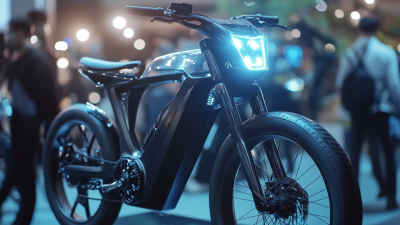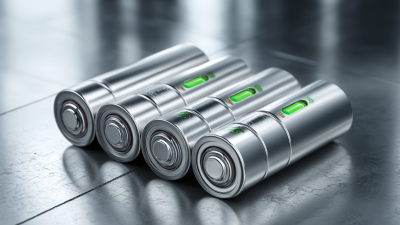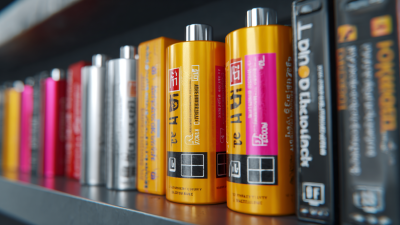As the demand for environmentally friendly transportation solutions rises, the search for sustainable options in the electric bike industry becomes increasingly essential. One key component influencing the performance and eco-friendliness of e-bikes is the battery system, particularly the Hailong Ebike Battery. This battery, known for its reliability and efficiency, has garnered attention for its role in enhancing the overall riding experience. However, with growing environmental concerns, it's crucial to explore eco-friendly alternatives that not only meet the performance standards of the Hailong Ebike Battery but also contribute to a greener planet. In this blog, we will delve into various innovative and sustainable battery options available on the market, offering valuable tips for eco-conscious e-bike enthusiasts looking to make a positive impact without compromising on quality or performance.

The growing adoption of electric bikes (eBikes) has raised critical questions about the environmental impact of traditional eBike batteries. Unlike conventional vehicles that often rely on combustion engines, eBikes utilize batteries that can pose significant ecological challenges, especially when considering their lifecycle from production to disposal. Traditional lithium-ion batteries, while prevalent due to their performance, are notorious for their carbon footprint and resource-intensive manufacturing processes. Understanding these implications is vital as the market shifts towards more sustainable alternatives.
As we explore eco-friendly battery options, the focus is on developing solutions that mitigate these environmental impacts. Innovations such as solid-state batteries and organic materials are gaining traction, offering potential to reduce reliance on rare minerals and lower overall emissions. Additionally, improved recycling methods are essential to create a circular economy for eBike batteries, minimizing waste and expanding the viability of battery reuse. The ongoing evolution in battery technology reflects not only a necessity for sustainability but also an opportunity for manufacturers to distinguish themselves in a competitive market by prioritizing eco-conscious solutions.
| Battery Type | Material Composition | Lifespan (Years) | Recycling Efficiency (%) | Carbon Footprint (kg CO2e) |
|---|---|---|---|---|
| Lithium-ion | Lithium, Cobalt, Graphite | 3-5 | 90 | 150 |
| Lead Acid | Lead, Sulfuric Acid | 2-3 | 50 | 400 |
| Nickel-Metal Hydride | Nickel, Cobalt, Hydrogen | 5-7 | 70 | 300 |
| Solid-State | Solid Electrolytes, Lithium | 10+ | 95 | 100 |
| Bio-based Battery | Organic Materials | 5-10 | 100 | 80 |
The global shift towards sustainable transportation has spurred significant interest in eco-friendly battery alternatives for e-bikes, particularly in light of the rising demand for electric vehicles (EVs). According to recent industry analyses, the e-bike market is expected to grow at a compound annual growth rate (CAGR) of 10.6%, driven largely by innovations in battery technology. Traditionally, e-bikes have utilized lead-acid and lithium-ion batteries, both of which exhibit varying degrees of environmental impact. A life cycle environmental impact assessment revealed that lithium-ion batteries, while more efficient, still contribute substantially to CO2 emissions throughout their lifecycle.
Emerging alternatives, such as recycled materials and bio-based batteries, present promising solutions to mitigate these sustainability challenges. Research indicates that shifting towards these eco-friendly battery packs can significantly reduce the overall carbon footprint associated with e-bikes. Furthermore, as the demand for lithium-ion batteries continues to soar with the global push for lower GHG emissions, it becomes imperative to explore the long-term availability of lithium and address potential supply risks. By prioritizing sustainable alternatives, the e-bike industry can not only enhance its environmental credentials but also align itself with the broader goal of decarbonizing the transport sector.
When exploring eco-friendly alternatives to Hailong ebike batteries, it is essential to consider several key features that contribute to sustainability. One crucial factor is the composition of the battery cells. Lithium-ion batteries are known for their efficiency and longevity; however, newer technologies, such as lithium iron phosphate (LiFePO4), offer improved safety and longer lifecycles. According to a report from the International Energy Agency (IEA), the average lifespan of LiFePO4 cells can extend beyond 2000 charge cycles, reducing the frequency of battery replacements and minimizing waste.
Another significant feature to evaluate is the production and recycling processes of the batteries. Sustainable ebike battery solutions should prioritize eco-friendly manufacturing practices, including reduced carbon emissions and responsible sourcing of raw materials. A guide by the World Economic Forum highlights that up to 95% of lithium-ion battery components can be recycled, thus offering a pathway to a circular economy. It is vital to select battery manufacturers that commit to comprehensive recycling programs that ensure materials are reused rather than ending up in landfills. By focusing on these characteristics, consumers can make informed decisions that not only benefit their ebike performance but also align with eco-conscious values.
When it comes to powering Hailong e-bikes, the choice of battery significantly influences both performance and environmental impact. Eco-friendly batteries, such as lithium iron phosphate (LiFePO4) and nickel manganese cobalt (NMC), present compelling alternatives to traditional lithium-ion batteries. According to a report by the International Energy Agency (IEA), the production of conventional lithium-ion batteries can emit up to 150 kg of CO2 per kWh, whereas eco-friendly options can reduce this footprint by up to 30%, making them a more sustainable choice for environmentally conscious consumers.

Cost-effectiveness is another critical factor in determining the battery of choice. While eco-friendly batteries may have a higher initial cost—often ranging from 10% to 20% more than their conventional counterparts—their longer lifespan and lower maintenance costs can lead to savings over time. A study published by the Battery University indicates that LiFePO4 batteries can last up to 5,000 cycles compared to 1,000 cycles for standard lithium-ion batteries. This longevity not only provides cost savings but also enhances overall performance, leading to increased customer satisfaction and reduced environmental impact, making eco-friendly batteries a smart investment for Hailong e-bike enthusiasts.
As the popularity of electric bikes continues to rise, so does the critical need for
proper disposal and recycling of their batteries.
Traditional lithium-ion batteries, commonly found in e-bikes, can pose
environmental threats if not disposed of responsibly. It’s essential to understand the importance of
recycling these batteries
instead of tossing them in the regular trash, as this can lead to hazardous chemical leaks and pollution.
To ensure safety and sustainability, e-bike owners should seek out designated
e-waste recycling centers or battery collection programs.
Many local municipalities and electronic retailers offer these services, making it easier
to dispose of old batteries responsibly. Additionally, some manufacturers provide
take-back programs, allowing consumers to return
used batteries directly to them for proper recycling. By engaging in these practices, individuals can
significantly reduce their ecological footprint while contributing to a circular economy that
prioritizes reuse and resource conservation.









